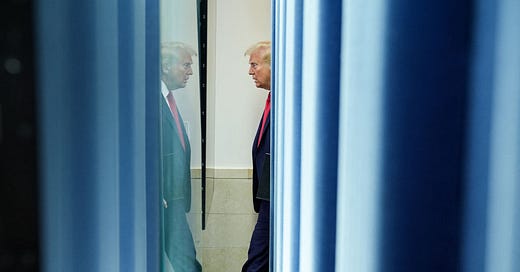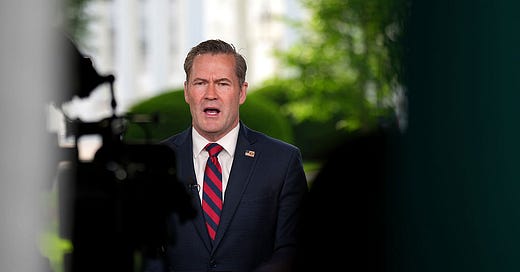
My breakfast today consisted of crow, with a side of humble pie. I’m on a restricted diet, because I’ve just been exposed as a prisoner of my pre-Trump Washington expectations. On Monday, I wrote of an impending “sudden shock” from the president’s threatened 25 percent tariffs on goods from Canada and Mexico.
To summarize the comments section: “This did not age well.” I did not anticipate that, within two days, he would pause the tariffs for 30 days, citing promised improvements on border control from both countries.
For those of us in the explaining biz, the usual response to such a predicament is something like: “But my essential point remains correct.” That won’t fly at The Free Press. Instead, here’s some transparent lesson learning.
Mistake No. 1: I took Trump seriously, but not literally. His February 1 executive order stipulated that tariffs would not take effect until February 4, creating a window for last-minute negotiations. I was so focused on his apparent determination to impose the levies, despite what he said could be “pain” for Americans, that I discounted this clearly stated proviso.
Mistake No. 2: I took Trump literally, but not seriously. I accepted that he believed his own claim that tariffs always benefit the U.S., and I judged that his expressed demands about fentanyl and migrants were so vague as to be intentionally impossible to meet. It appears instead that he was aware, and wary, of the harm sudden tariffs could do to the U.S. So, eager to avoid it, he settled for a plausible claim that he got our neighbors to fight harder against migration and drugs.
Wiser now, I’m tuning out the presidential theatrics and focusing on the language of Trump’s latest response to our neighbors. Those orders say he will put off a decision on tariffs until March 4. But he’ll impose them “if the illegal migration and illicit drug crises worsen”—my emphasis—and if one or both “fails to take sufficient steps to alleviate these crises.”
Note that, of the three possible outcomes—a situation that’s worse, better, or unchanged—two would result in no tariffs. Note, too, that it’s entirely Trump’s call.
As the president likes to say, we’ll see what happens: We’ll find out whether Canada and Mexico agreed to anything meaningful, and whether Trump beat them, and his domestic critics, at 4D chess. Or he might end up launching his trade war March 4, with more legitimacy—he’ll say—because he graciously gave the neighbors a second chance. Then again, maybe the whole thing was a bluff, soon to be forgotten amid the roar of new crises. But you won’t hear me prejudging the matter.
I do stand by the argument I made in my piece Monday, that Congress has ceded too much power over tariffs and trade to the president, and that Trump has shown we now live in a country where one man can declare an emergency and launch—or threaten—a devastating trade war. This is contrary to sound constitutional principles, destabilizing, and no way to run a railroad, let alone the world’s largest economy.
So how about it, comments section? In the same self-critical spirit, does that essential point remain correct?













